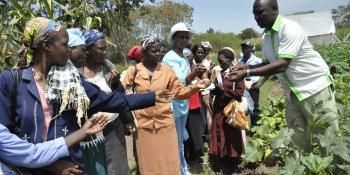Push for agriculture within climate discussions in East Africa continues

by Catherine Mungai and Vivian Atakos
CCAFS East Africa in partnership with the Common Market for Eastern and Southern Africa (COMESA) and the African Climate Policy Centre (ACPC) are leading initiatives aimed at including agriculture into climate change policy discussions at national, regional and international levels.
The initiatives include a series of consultative workshops bringing together climate change and agriculture experts, negotiators from government institutions, universities, research institutions, NGOs, civil society, farmer organizations and the private sector to develop a comprehensive strategy on including agriculture into climate change discussions and to articulate the African needs and aspirations on agriculture.
A workshop held from 13 to 15 February 2013, in Tanzania, brought together 19 delegates to review the outcome of the United Nations Framework Convention on Climate Change (UNFCCC) Conference of the Parties (COP 18) held in December 2012 and to prepare for the Bonn climate talks planned for June this year.
Read more: CCAFS at COP18
Delegates, who included the African Group of Negotiators (AGN), agricultural and climate scientists and academia, are developing a position paper for the AGN on Agriculture and Climate Change to be used during the Bonn climate talks.
Following the meetings “the AGN can comfortably and confidently apply the SBSTA mandate from article 9 of the convention in the African context regarding agriculture,” said Fredrick Kossam, Head of Climate Change and Research Services, Ministry of Natural Resources and Environment, Malawi and a member of the AGN.
During COP18, agriculture was a subject of discussions. Africa played a critical role as the chair in steering negotiations aimed at incorporating agriculture in the international climate change regime to be concluded by 2015. Issues related to agriculture were however suspended and are due to resume at the Bonn climate talks in June 2013.
Read more: Agriculture, Landscapes and Livelihoods Day during COP18, brought the science to the negotiators.
“The AGN now recognize that although agriculture can be seen in the context of adaptation, there are co-benefits to mitigation actions," noted Chebet Maikut, from the Ministry of Water and Environment, Uganda.
He continued by saying that "key issues of focus include: the critical impact of agriculture as it contributes to our sustainable development in Africa, the adverse impacts of climate change on agriculture in the country, technology transfer, appropriate breeds, how to support farmers address the impacts of climate change affecting our production and the entire value chain and the livelihood connection.” Chebet is the Principal Programme Officer of the Mitigation Climate Change Unit within the Ugandan Ministry.
Agriculture contributes significantly to food security, poverty reduction and employment in rural households in Africa. The agricultural sector sequesters carbon, but also generates significant amounts of greenhouse gasses (GHGs). Agriculture contributes about 14% of global GHGs, of which 70% comes from developing countries (FAO, 2009). In order to sustain agricultural production, African governments need to embrace appropriate policies to support adaptive capacity of agricultural producers to the effects of climate change and variability.
During the 14th African Ministers Conference on Environment (AMCEN) in September 2012, the ministers of environment provided guidance on the common African position on agriculture. In particular, AMCEN recommended that adaptation in agriculture should remain the primary objective for Africa and that a comprehensive work programme on agriculture be established under the Cancun Adaptation Framework.
In addition, during the side event "Lessons Learnt from Scaling-Up Actions on Food Security, Adaptation and Mitigation" organised by CCAFS, it emerged that Africa needs good case studies to showcase vulnerabilities to a changing climate and also good practices for coping with climate variability. Consequently, ACPC, CCAFS, and COMESA embarked on a rigorous process of putting together case studies for prioritizing needs for adaptation and mitigation in Africa.
A strategic meeting for the AGN and experts to bolster the common African position on agriculture as guided by AMCEN and with scientific expertise was held between the 8th and 9th November 2012, in Addis Ababa, Ethiopia. The meeting ensured enhanced AGNs preparedness during COP18.
What we will be up to during Bonn climate talks 2013? Get the details on our event page.
This story was written by Catherine Mungai, Program Specialist and Vivian Atakos, Communications Officer, both working at the CCAFS East Africa regional office. Follow East Africa on Twitter: @Cgiarclimate_ea


